How the scrapping of Roe v Wade threatens Ruth Bader Ginsburg’s legacy
The Supreme Court’s Ruth Bader Ginsburg was loved by her fans but did she make crucial mistakes that tarnish her reputation, asks Andrew Buncombe

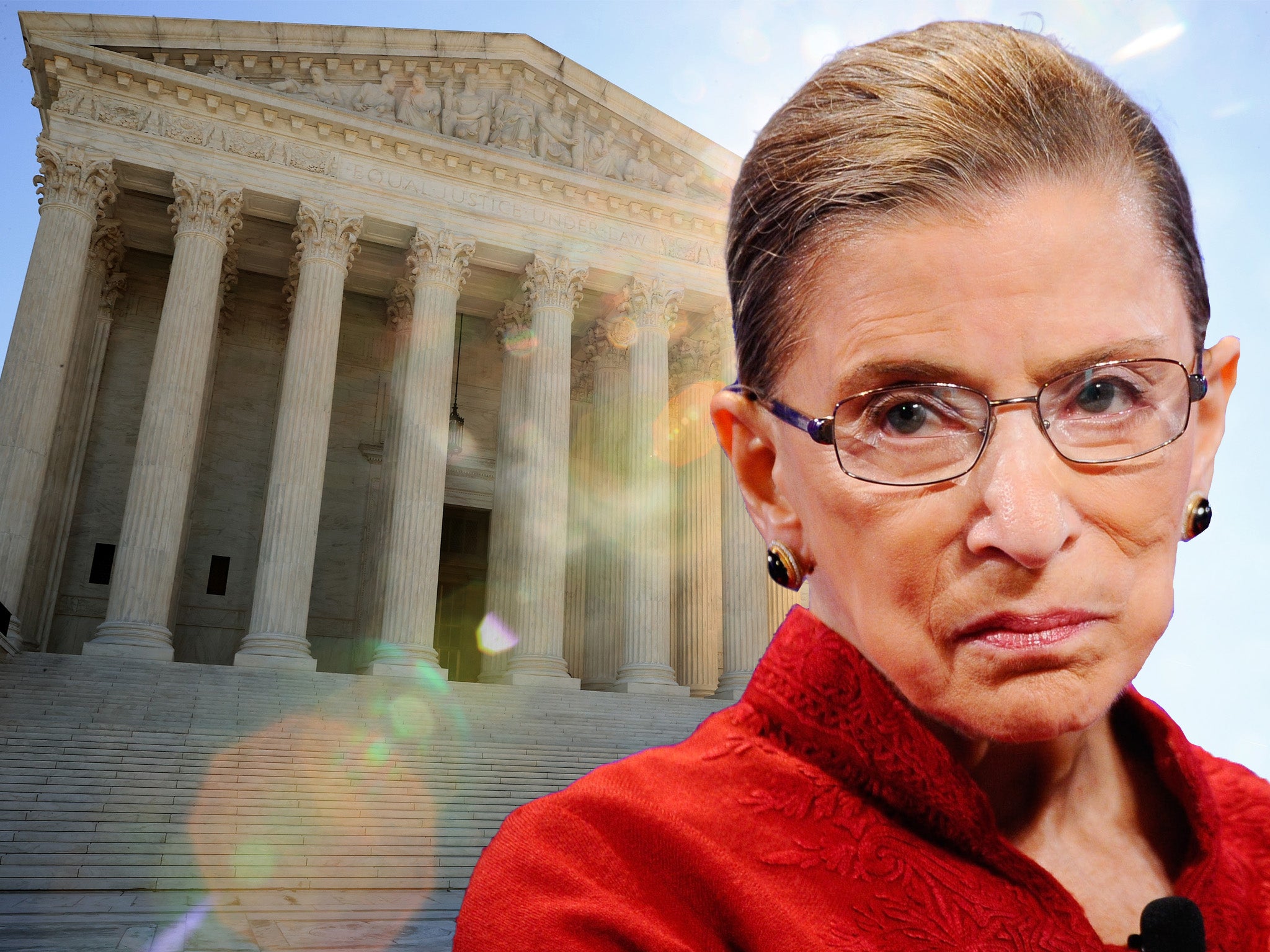
By any understanding, it was a harsh assessment, unforgiving perhaps: “Unpopular take: Ginsburg should have f***ing retired instead of dressing up in Opera costumes and drinking sherry with Scalia,” tweeted Michele Dauber, a Stanford law professor not known for mincing her words.
“Hope all you RBG cult members enjoy your forced pregnancies.”
The person she was talking about was Ruth Bader Ginsburg, the meme-fuelling, Bill Clinton-nominated late Supreme Court justice who died in September 2020.
And the date of Dauber’s remarks was 2 May 2022, the day Politico revealed it had obtained a draft judgement from the current Supreme Court that could strike down Roe v Wade, and in doing so end the constitutional right to abortion.
As it was, her remarks were not so unusual.
Back in those hot angry days, as the nation was suddenly confronted by the fact that a legal and cultural bulwark that two generations of women had leaned on to ward off efforts to stop them from regulating their own pregnancies and avoid the back-street horrors of earlier times, had everyone second-guessing about the nation’s highest court and its conservative majority.
What if president Barack Obama had really pushed and pushed and pushed to get a vote for Merrick Garland with the same stubborn state of mind that Mitch McConnell had refused to table one?
What if the Democrats had refused to give a hearing to Amy Coney Barrett, and argued with the same ferocity Republicans had about Garland, that it was not appropriate to bill a seat with just months left in a president’s term?
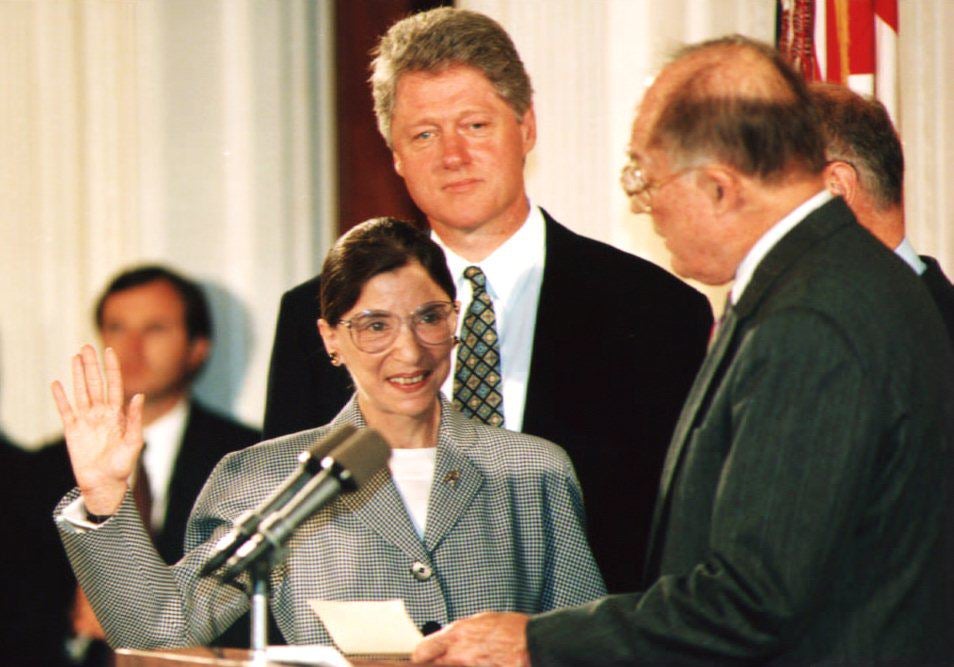
And, of course, what if Ginsburg had heeded those – Obama seemingly among them – who had urged her to stand down and allow a liberal justice to replace her, rather than dying just a few months before the end of Trump’s term, and thereby granting him the power to shape the make-up court for years and perhaps decades to come.
Trump certainly knew how powerful and long-lasting his actions would be. “Apart from matters of war and peace, the nomination of a Supreme Court justice is the most important decision an American President can make,” he said when he was pondering who he would pick to fill Ginsburg’s vacancy, releasing a list of potential names that had been vetted by the right-wing federalist society.
Inspiration
It is now two years since Ginsburg – RBG to her fans and supporters – died at the age of 87. She had first been diagnosed with cancer in 1999, and when she received a new diagnosis for pancreatic cancer in 2013, some friends had suggested she might consider standing aside. She was to die of complications due to cancer.
Two years on from the outpouring of sadness that followed her death, Ginsburg is still much admired. There are murals and statues and T-shirts that bear her name, and a two-volume collection of her most important opinions has recently been published by Talbot.
The collection – Representative Opinions of Ruth Bader Ginsburg – is edited by Judge Nancy Gertner, who writes of first seeing the justice when Gertner was in her 20s, and justice Ginsburg was addressing a conference about women and the law in the early 1970s. At the time, Ginsburg headed the American Civil Liberties (ACLU) Women’s Rights Project.
“Over the next decade, her record before the Supreme Court – both in cases in which she and the ACLU represented the plaintiff and when she argued as amicus curiae – was unparalleled,” writes Gertner.
She figured out a way to get women to be part of the constitution. And yet, what she has helped to give us is a court that for a long, long time is going to be undoing the equality rulings that she was part of
“She was all that I wanted to be. To devote one life to using legal skills for civil rights, for women’s rights, and better yet, to produce a remarkable body of work, to make a difference. I could think of nothing better.”
Yet, just as she is being celebrated, so some are questioning the decision not to stand aside in 2013, a year after Obama secured reelection and when Democrats still held control of the Senate.
It was reported at the time, that Obama hosted Ginsburg for lunch, having reached out to the then 80-year-old justice through his White House counsel, Kathryn Ruemmler.
The lunch was low-key and polite, and it has been reported that the president was careful not to ask Ginsburg directly. According to the New York Times, Obama, did however raise the matter of the looming 2014 midterm elections and how Democrats might lose control of the Senate.
“Implicit in that conversation was the concern motivating his lunch invitation – the possibility that if the Senate flipped, he would lose a chance to appoint a younger, liberal judge who could hold on to the seat for decades,” the newspaper reported.
The justice did not bite. Neither did she budge to a previous effort by Senator Patrick Leahy, the Democrat from Vermont who chaired the Senate judiciary committee, and who would have had oversight of securing the confirmation of her replacement.
It was made clear to both men, that despite having twice suffered from cancer, Ginsburg, was committed to continuing her work.
A column published in 2014 by Erwin Chemerinsky, Professor of law at the University of California, was among those calling on her to stand aside.
“In deciding when to retire, Ginsburg, who is the eldest among the nine justices, should maximize the chance that her successor will be someone with her values and views,” he wrote in an open letter
Ginsburg was not moved. And she was rather angry at those who said it was time to move on.
That year, the justice, who famously posed for photographs working out with her personal trainer, confirmed to Reuters she had met with the president but rejected any suggestion that Obama had pressed her to stand down, or else was “fishing” for her to do so.
Asked why Obama invited her, she said: “Maybe to talk about the court. Maybe because he likes me. I like him ... I don’t remember the specifics, but we did talk about the court.”
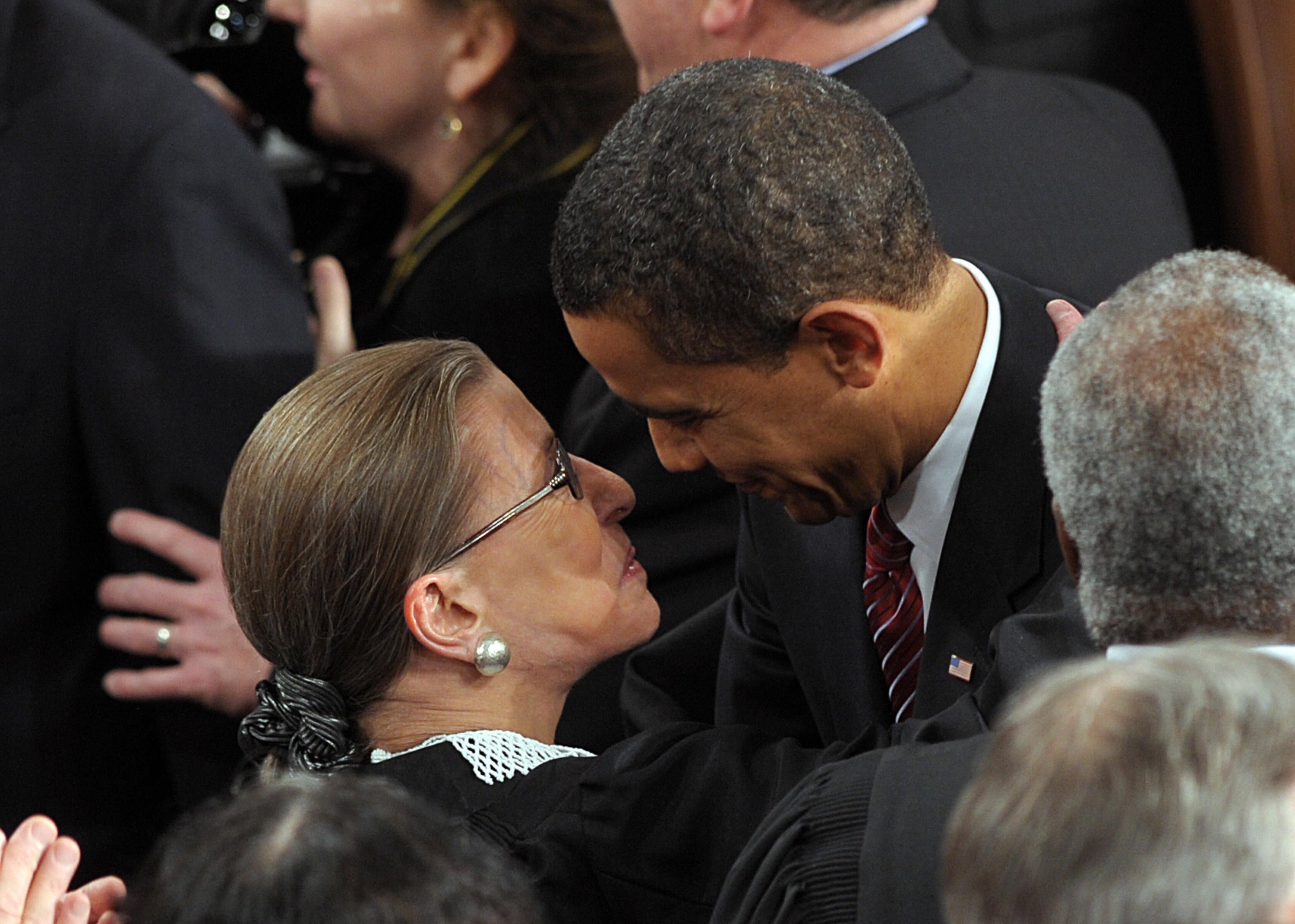
She was also asked about her health, and what she believed Obama wanted her to do in regard to continuing on the court. She said: “I think he would agree with me that it’s a question for my own good judgment.”
On the basis of sex
Ginsburg was confirmed 96 to 3 – with one senator not voting – in August 1993 and served until her death in the autumn of 2020.
Nina Totenberg, a journalist and longtime confidant, wrote on Twitter: “Days before her death, as her strength waned, #RBG dictated this statement to her granddaughter Clara: ‘My most fervent wish is that I will not be replaced until a new President is installed.’ She knew what was to come.”
The death of the justice, who was married for more than 50 years and had two children, marked the end of a career that was extraordinary by any measure.
Among the Supreme Court judgements dealing with race and gender and discrimination for which she is remembered by legal scholars, was 1996’s United States v Virginia, which struck down the male-only admission policy of the Virginia Military Institute.
She also authored Olmstead v LC, another landmark case, which recognised constitutional rights for people with mental disabilities, who wanted to live in the community.
Another landmark opinion was the majority she authored in 2000 in Friends of the Earth Inc v Laidlaw Environmental Services, which found residents had the right to seek address from any industrial polluter that was impacting.
Many of her most famous contributions to the law were when she appeared before the courts, often representing the ACLU, most famously establishing a series of careful, strategic victories to help cement gender equality.
The cases include Frontiero v Richardson, but most famously 10th Circuit in Moritz v Commissioner on behalf of a man who had been denied a caregiver deduction because of his gender. The court ruled in Ginsburg’s favour, and in doing so underscored the law ought to judge genders equally. Men, she argued, “were no less trapped in their assigned roles”, than women.
In the 1974 Women and Law textbook, Ginsburg wrote: “Only when men and women are able to see themselves and each other without preconceptions, as human beings, will the underlying support for sex-based discrimination disappear.”
Roe goes
In May 2022, with Ginsburg having died 18 months earlier, and the court having transformed into a 6-3 conservative majority that gave it remarkable power, a draft opinion authored by Samuel Alito, in regard to a case from Mississippi was leaked, revealing the court would not only uphold a 15-week abortion ban in that scrap but – far more significantly – also overturn Roe v Wade.
Ginsburg had long defended abortion rights, and had several times been part of opinions that upheld the constitutionality of Roe.
And yet in the emotions of that moment, Ginsburg became the subject of attack, unable to defend herself and an easy target for the rage of those angry with the court.
Later, there would be more reflection on how the abortion rights movement had rather dropped the ball, become complacent, and allowed opponents of abortion to work at state and local level for a victory.
Dauber – who did not respond to enquiries – toldPolitico of Ginsburg’s decision not to stand down in 2013: “She gambled. But she didn’t just gamble with herself. She gambled with the rights of my daughter and my granddaughter. And unfortunately, that’s her legacy. I think it’s tragic.”
Dorothy Samuels, a former member of the New York Times editorial board, and a senior fellow at the Brennan Centre for Justice, told the same publication: “It’s certainly hard for me, now, to think of her work and of her – and not to, these days, work up a degree of regret and anger.”
She added: “This is so multilayered because she cared so passionately about advancing equality for everybody. She figured out a way to get women to be part of the constitution. And yet, what she has helped to give us is a court that for a long, long time is going to be undoing the equality rulings that she was part of.”
Chemerinsky, who wrote the 2014 open letter calling on her to stand down, tells The Independent he stands by that opinion.
“Ruth Bader Ginsburg had an amazing career as a lawyer and a justice. She made a huge difference and should be an inspirational figure for generations to come,” he says.
“But if she had retired in 2014, as I and others urged, she would have been replaced by someone with her values and views. She gambled and we all lost.”
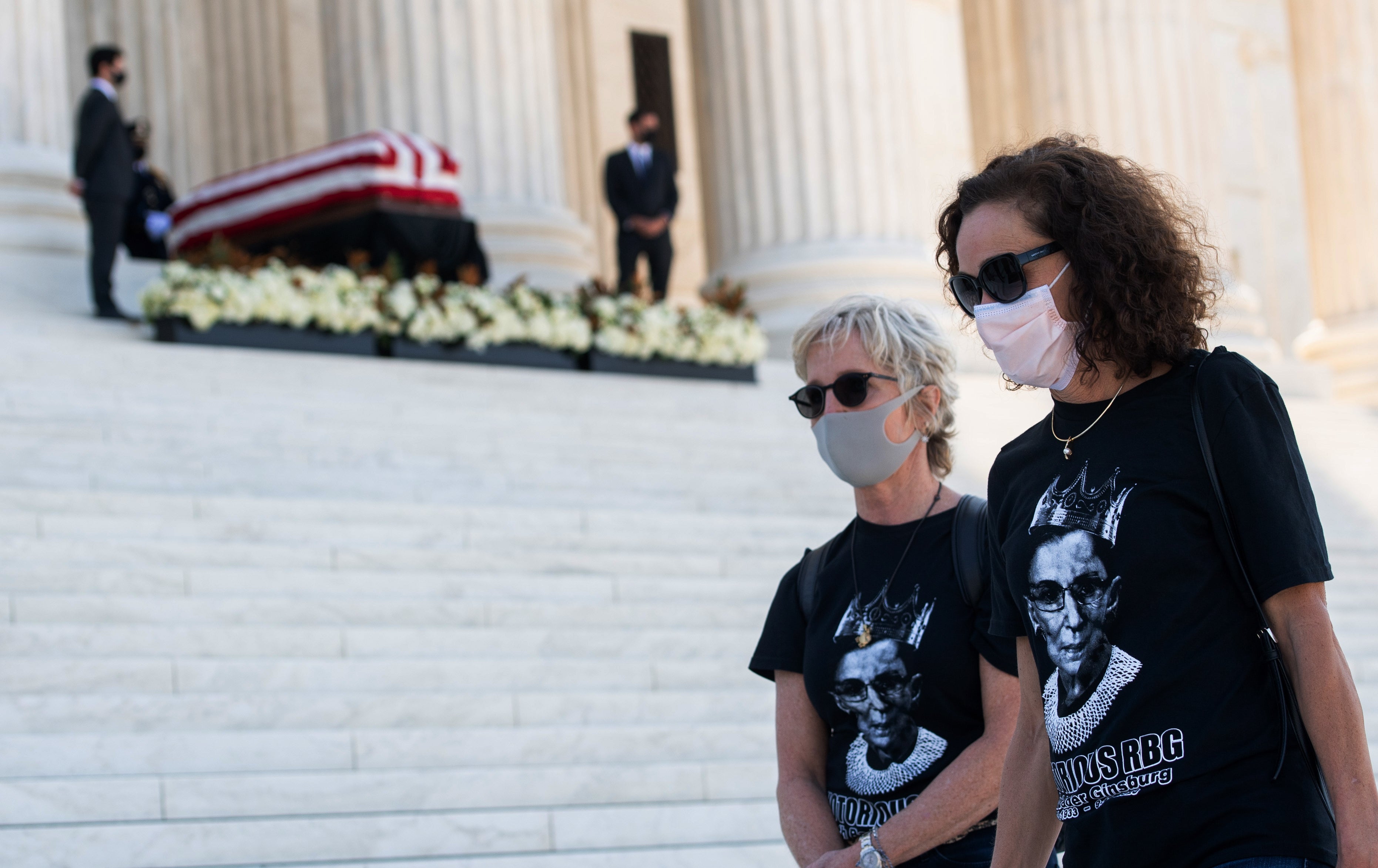
Nobody would be angrier than her
Yet many – especially those who knew Ginsburg well – argue that the criticism is unfair.
Lawyer Rebecca Buckwalter-Poza, a legal and cultural commentator who has appeared before the Court of Appeals for the Armed Forces, says she was struck by how many people piled on Ginsburg when Roe was scrapped.
“My view is that she was protecting the institution and took a very sort of principled stance on that,” she says.
Had she stood down when Obama was president, the move would have been seen as being blatantly political. She would not have wanted to do something she would have considered as being cynical.
“I think she had more faith and our democracy than we’ve proven it deserves,” she adds. “I think it’s just a matter of her living out her values, and I would almost think less of her if she had just timely retired based on the balance of the court.”
Buckwalter-Poza says there is a bigger issue that people are missing.
“No one could be angrier in this moment with Ruth Bader Ginsburg than Ruth Bader Ginsburg would have been with herself,” she says. “And that’s part of what’s funny to me, about people who want someone to be angry at.”
Paul Schiff Berman, Professor of law at George Washington University, who clerked for Ginsburg during the 1997-1998 Supreme Court term and remained in contact over the years, also dismisses the idea saying she could have resigned, arguing that she was confident about her health.
He says Ginsburg will be remembered for her work as a litigator and justice, making gender what is termed a “suspect” classification, and therefore likely to suffer discrimination.
How does he remember her as both a justice and a person?
“What I admire most about her is she always kept her eye on the horizon. She always took the long view and focused on the work at hand,” he says, speaking from Washington DC.
“She did not allow herself to be buffeted by the emotions of the moment – disappointments or jealousies or being on the losing side of some case. She always dove back in and looked at what was the work that needed to be done next.”
While clerks only stay with a justice for a year, Berman says Ginsburg kept in touch with all her former staff as the years continued.
“She treated her clerks as part of her extended family. We had reunions, she wrote recommendation letters for me. Any new job I got, or new article I published, she wrote me a note,” he adds.
“She met my son. She actually officiated at our wedding. She takes the relationship where she took the relationship with her clerks very seriously.”
Amanda Tyler also clerked for Ginsburg and enjoyed a relationship that continued for the rest of the justice’s life.
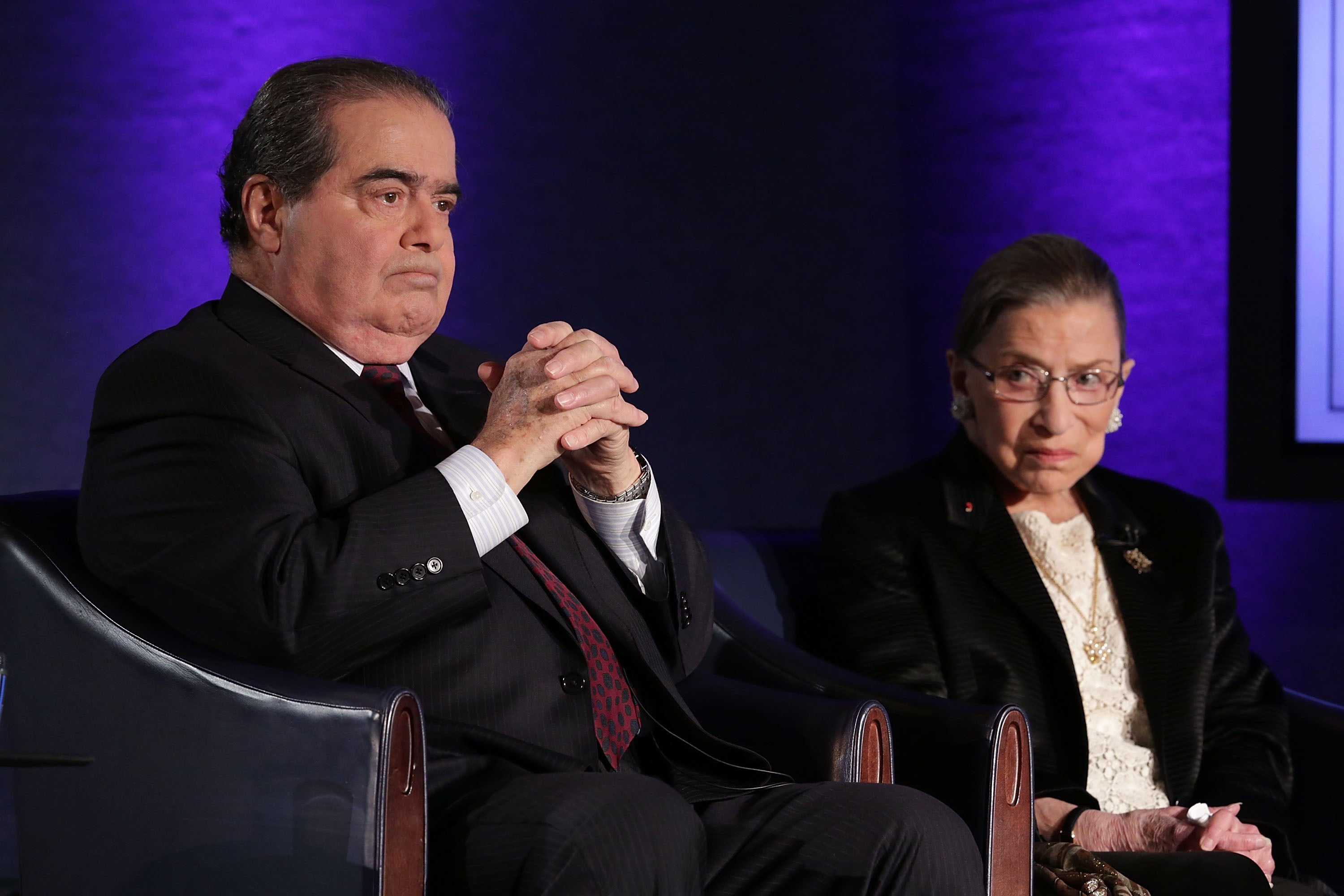
Indeed, Tyler, a Professor of Law at the University of California, Berkeley, co-authored a book with Ginsburg. The experience was bitter-sweet; Ginsburg died before it could be completed, making Tyler even more determined to ensure it was finished.
Their book, Justice, Justice Thou Shalt Pursue: A Life’s Work Fighting for a More Perfect Union, was published in March 202 and was inspired by a lecture Ginsburg delivered at Berkeley in 2019 and a public conversation hosted by Tyler.
She also says those seeking to blame the justice for not standing down earlier, have to put it in context of what Ginsburg felt at the time – she had a clean bill of health from her doctor, and nobody believed Donald Trump was going to be elected president.
“I am sure she would have been happy to let the first woman president of the United States, pick her replacement,” Tyler says from Berkeley. “But that is not what happened.”
Does the overturn of Roe and the fresh focus on Ginsburg’s decision about retirement impact her legacy?
“I think her legacy stands,” says Tyler, “and is much broader than just her time on the court. It encompasses her time as an advocate, which was enormously significant in changing the legal and social landscape with respect to gender equality in this country. I think her greatest legacy is that she stood for and fought for, both as an advocate and as a justice, was principally to open up opportunities for everyone to enjoy real and significant equality.”
She adds: “That is something that will live on beyond her, and that hopefully her life’s work will inspire others to keep the work going. To keep the fights waging.”
Join our commenting forum
Join thought-provoking conversations, follow other Independent readers and see their replies
Comments



Bookmark popover
Removed from bookmarks